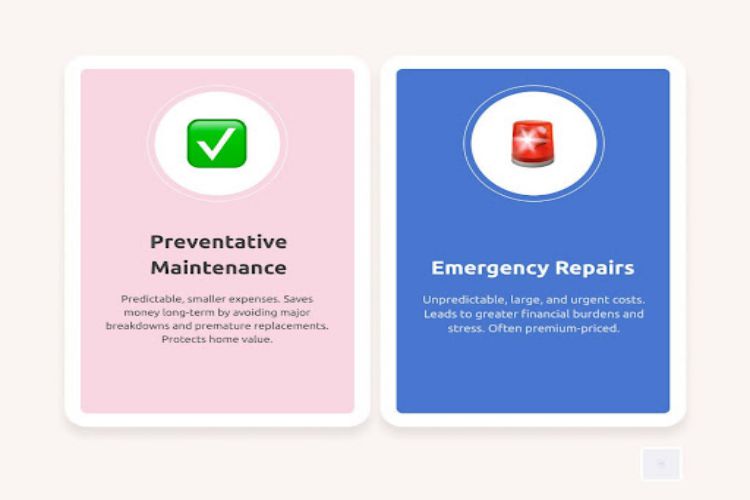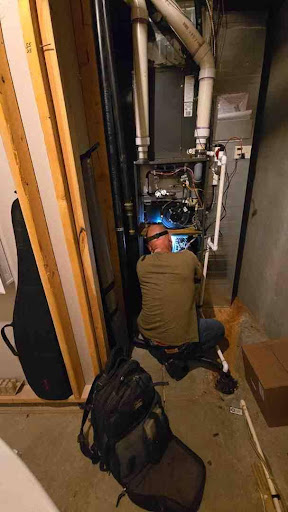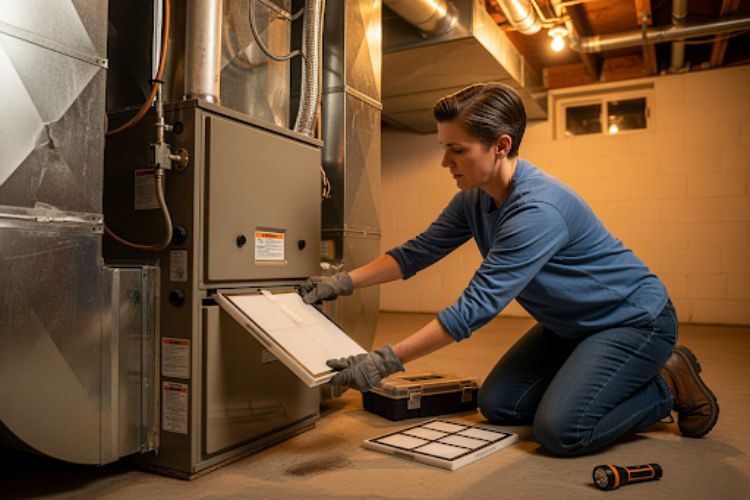The Importance of Proactive Home Care
We understand that owning a home brings a unique set of responsibilities. Keeping up with repairs and general upkeep can often feel overwhelming. Ignoring these vital tasks, however, can lead to more significant and expensive problems down the road. This is where professional home maintenance services become invaluable. Regular maintenance protects your investment, ensures safety, and boosts your home’s efficiency. This comprehensive guide will explore the many benefits of proactive home care and help you steer the various services available, so you can enjoy a healthy and efficient home with peace of mind.
 A home is often our largest and most cherished asset. Like any significant investment, it requires consistent care and attention to retain its value and functionality. Proactive home maintenance isn’t just about fixing things when they break; it’s about anticipating potential issues, preventing costly damage, and ensuring the long-term health and efficiency of your living space.
A home is often our largest and most cherished asset. Like any significant investment, it requires consistent care and attention to retain its value and functionality. Proactive home maintenance isn’t just about fixing things when they break; it’s about anticipating potential issues, preventing costly damage, and ensuring the long-term health and efficiency of your living space.
A 2023 home repair habits study by Today’s Homeowner reveals a concerning trend: over half of homeowners delay home repair and maintenance because of the expense. While understandable, this delay often leads to even greater financial burdens and stress down the line. We believe that viewing maintenance as an investment, rather than an expense, can fundamentally change this dynamic.
Why Regular Maintenance is Your Home’s Best Defense
Regular home maintenance acts as your home’s best defense against wear and tear, unexpected breakdowns, and the passage of time. It’s akin to a yearly physical for your home – a preventive measure designed to head off potential problems before they escalate.
- Increased Resale Value: A home that has been consistently maintained signals responsibility and care to potential buyers. Well-kept systems, a solid exterior, and functional interiors all contribute to a higher market value and a smoother selling process.
- Improved Safety: From checking electrical systems to ensuring structural integrity, maintenance tasks directly contribute to the safety of your household. Detecting and addressing issues like faulty wiring, gas leaks, or compromised foundations can prevent accidents and hazards.
- System Longevity: Regular servicing of major appliances and systems like HVAC units, water heaters, and plumbing extends their operational lifespan. This means fewer premature replacements, saving you significant money over time.
- Improved Energy Efficiency: Clean filters, sealed ducts, properly insulated windows, and efficient heating/cooling systems all work together to reduce energy consumption. Proactive maintenance ensures these components are functioning optimally, lowering your utility bills.
- Avoiding Costly Repairs: Small, unaddressed issues have a notorious habit of snowballing into major, expensive problems. A dripping faucet can lead to water damage and mold, while a minor roof leak can compromise your home’s entire structure. Regular checks catch these issues early.
- Peace of Mind: Knowing that your home’s critical systems are in peak working condition provides invaluable peace of mind. You can rest assured that your family is safe, your investment is protected, and you’re less likely to face sudden, disruptive breakdowns.
The Financial Benefits of a Maintained Home
The financial advantages of consistent home maintenance are significant and extend far beyond simply avoiding repair costs. It’s a strategic approach to managing your home budget and protecting your most valuable asset.
- Saving Money Long-Term: While there’s an upfront cost associated with maintenance services, these expenses are typically far less than the cost of emergency repairs or premature replacements. For instance, replacing a worn-out HVAC filter is inexpensive; replacing a burnt-out compressor due to neglected filters is not.
- Budget Management: Regular maintenance allows you to budget for predictable, smaller expenses throughout the year, rather than being hit with large, unexpected bills that can strain your finances.
- Avoiding Surprise Bills: Emergency repairs often come with premium pricing due to urgency. Proactive maintenance drastically reduces the likelihood of these sudden, budget-busting surprises.
- Protecting Your Investment: Your home is likely your biggest financial investment. Maintaining it diligently ensures that its value appreciates or at least holds steady, rather than depreciating due to neglect.
The International Association of Certified Home Inspectors states that the typical home should be checked for maintenance needs at least yearly. If your home is older or has not been adequately maintained, it may require more frequent attention. This annual check-up provides a comprehensive overview, helping homeowners prioritize tasks and allocate resources effectively.
 Core Areas of Professional Home Maintenance Services
Core Areas of Professional Home Maintenance Services
Modern homes are complex ecosystems, comprising numerous interconnected systems that require specialized care. Professional home maintenance services cover a wide spectrum, ensuring every critical component of your home functions optimally. We categorize these services into several core areas, each vital for a healthy and efficient home.
 HVAC and Air Quality
HVAC and Air Quality
Your heating, ventilation, and air conditioning (HVAC) system is crucial for comfort and indoor air quality. Neglecting it can lead to inefficient operation, higher energy bills, and poor air circulation.
- Furnace Maintenance: Annual tune-ups ensure your furnace runs efficiently and safely, preventing breakdowns during cold months. This includes checking for gas leaks, cleaning components, and ensuring all parts are in good working order.
- Air Conditioning Service: Similar to furnaces, AC units benefit from yearly inspections and cleaning to maintain efficiency, prevent refrigerant leaks, and ensure cool air delivery when you need it most.
- Duct Cleaning: Over time, ducts accumulate dust, allergens, and debris, impacting air quality and system efficiency. Professional duct cleaning removes these contaminants, improving airflow and indoor air.
- Filter Replacement: While often a DIY task, professionals can advise on the best type of filters for your system and schedule regular replacements, which is vital for both air quality and HVAC longevity.
- Improving Indoor Air: Beyond cleaning, professionals can assess your home’s air quality and recommend solutions like humidifiers, dehumidifiers, UV germicidal lights, or whole-house air filtration systems. These measures contribute to a healthier living environment. For those interested in maintaining a pristine and healthy home environment, exploring Eco-friendly home maintenance practices can offer valuable insights into sustainable cleaning and upkeep methods that benefit both your family and the planet.
Plumbing and Water Systems
A well-functioning plumbing system is essential for daily life. Even minor issues can quickly lead to significant water damage and health concerns.
- Leak Detection: Professionals use specialized tools to identify hidden leaks in pipes, fixtures, and appliances, preventing water waste and potential structural damage or mold growth.
- Water Heater Inspection: Regular checks of your water heater can extend its life, improve efficiency, and prevent unexpected cold showers or catastrophic tank failures. This includes flushing the tank, checking anode rods, and inspecting pressure relief valves.
- Drain Cleaning: Slow or clogged drains are a nuisance and can indicate deeper issues. Professional drain cleaning clears blockages and prevents backups, maintaining proper wastewater flow.
- Faucet Repair: Leaky faucets waste water and can cause unsightly stains. Professionals can repair or replace faulty components efficiently.
- Water Pressure Checks: Maintaining optimal water pressure (typically between 40-60 psi) is crucial for plumbing system longevity. Too high, and it can damage pipes and appliances; too low, and it affects daily comfort.
- Sump Pump Testing: For homes with basements, a functional sump pump is critical to prevent flooding. Regular testing ensures it’s ready to handle heavy rainfall.
Electrical System Safety
Your home’s electrical system powers everything from lights to essential appliances. Due to inherent safety risks, most electrical work should be handled by licensed professionals.
- Circuit Breaker Inspection: Professionals can inspect your electrical panel, ensuring circuit breakers are functioning correctly and that your system isn’t overloaded, which can be a fire hazard.
- Outlet Testing: Checking outlets for proper grounding and function, especially GFCI (Ground Fault Circuit Interrupter) outlets in wet areas, is vital for safety.
- Wiring Upgrades: Older homes may have outdated or insufficient wiring that cannot handle modern electrical demands. Professionals can assess and perform necessary upgrades.
- Light Fixture Installation: From simple ceiling lights to complex chandeliers, proper installation ensures safety and functionality.
- Ensuring Code Compliance: Electrical codes are in place for safety. Professionals ensure all work adheres to current local and national standards.
Exterior and Structural Integrity
The exterior of your home is its first line of defense against the elements. Maintaining its integrity protects your interior and contributes significantly to curb appeal.
- Roof Inspection: Regular inspections identify damaged shingles, flashing issues, or potential leaks before they cause extensive water damage to your home’s interior.
- Gutter Cleaning: Clogged gutters prevent proper water drainage, leading to fascia damage, foundation issues, and even ice dams in colder climates.
- Siding and Window Checks: Inspecting siding for damage and windows for cracks, seal failures, or drafts helps maintain insulation and prevents moisture intrusion.
- Foundation Review: Professionals can identify signs of foundation issues, such as cracks or settling, which can be extremely costly if left unaddressed.
- Deck and Patio Care: Cleaning, sealing, and repairing decks and patios not only extends their life but also ensures they remain safe for use.
- Landscaping: While often seen as aesthetic, proper landscaping, including tree trimming and maintaining proper drainage around the foundation, is crucial for preventing damage to your home’s structure.
 The Homeowner’s Role: DIY vs. Professional Help
The Homeowner’s Role: DIY vs. Professional Help
As homeowners, we often face the decision of tackling a maintenance task ourselves or calling in a professional. Understanding this distinction is key to effective home management, ensuring both safety and quality of work. While many small repairs can be handled by a diligent homeowner, certain tasks demand the expertise, tools, and experience of a trained professional.
Common DIY Home Maintenance Services
There’s a satisfying sense of accomplishment that comes with successfully completing a home maintenance task yourself. Many routine items are well within the capabilities of the average homeowner and can help save money while fostering a deeper connection with your home.
- Changing Filters: Regularly replacing air filters in your HVAC system is a simple yet impactful task that improves air quality and system efficiency.
- Cleaning Gutters: With the right safety equipment, clearing leaves and debris from gutters can prevent water damage and foundation issues.
- Patching Small Holes: Minor drywall holes from picture hanging or small dings can be easily patched and painted over.
- Tightening Handles: Loose cabinet handles, door knobs, or faucet handles are quick fixes that prevent further wear and tear.
- Caulking Windows: Re-caulking around windows and doors can seal drafts, improve energy efficiency, and prevent moisture intrusion.
- Testing Smoke Detectors: Regularly testing smoke and carbon monoxide detectors and replacing batteries is a critical safety task.
- Touching Up Paint: Small scuffs or marks on walls can be touched up with leftover paint, keeping your interiors looking fresh.
Most home repairs can be finished in a day or less, making many of these tasks manageable for a weekend warrior. Most of the time, homeowners can fix small problems on their own, like fixing loose handles, filling in nail holes, or touching up paint. However, it is critical to understand your limitations and prioritize safety.
When to Call a Professional
While DIY is great for minor upkeep, certain home maintenance tasks carry significant risks or require specialized knowledge, tools, and licensing. Knowing when to call a professional protects your home, your family, and your wallet from potentially disastrous mistakes.
- Structural Issues: Any concerns regarding your home’s foundation, load-bearing walls, or significant framing damage should always be assessed and repaired by a structural engineer or a qualified contractor. These issues require expert analysis and often specialized equipment.
- Electrical Work: Unless you are a licensed electrician, we strongly advise against attempting major electrical repairs or installations. Faulty wiring can lead to fires, electrocution, and severe damage. This includes panel upgrades, new circuit installations, and complex wiring repairs.
- Major Plumbing Repairs: While a leaky faucet might be DIY, burst pipes, water heater replacements, sewer line issues, or complex re-piping projects require the expertise of a licensed plumber. Incorrect plumbing work can lead to extensive water damage and health hazards.
- HVAC Servicing: Beyond changing filters, the intricate components of HVAC systems (furnaces, air conditioners, heat pumps) should be serviced by certified technicians. They have the training to handle refrigerants, electrical components, and complex diagnostics safely and effectively.
- Roofing: Repairing or replacing a roof is dangerous and requires specific skills to ensure proper installation and waterproofing. Leave significant roof work to experienced roofing professionals.
- Projects Requiring Permits: Many larger home improvement or repair projects require local permits. These are typically tasks that impact your home’s structure, electrical, or plumbing systems. Professionals are familiar with these requirements and can ensure your project complies with local building codes.
Mr. Handyman service professionals have an average of 10+ years of experience in the trades, highlighting the depth of knowledge often required for complex tasks. When in doubt, a consultation with a professional is always a wise investment.
Finding and Choosing Reliable Professionals
 Once you’ve identified tasks that require professional attention, the next crucial step is finding reliable and trustworthy home maintenance services. This process involves careful vetting to ensure you’re entrusting your home to skilled, reputable individuals or companies.
Once you’ve identified tasks that require professional attention, the next crucial step is finding reliable and trustworthy home maintenance services. This process involves careful vetting to ensure you’re entrusting your home to skilled, reputable individuals or companies.
How to Find Reliable Home Maintenance Services
The market for home services is vast, but not all providers offer the same level of quality or reliability. We recommend a multi-pronged approach to finding the best fit for your needs.
- Local Searches and Online Directories: Start with online searches for “home maintenance services near me” or specific services like “plumber [your city].” Websites like Angi (formerly Angie’s List) provide directories where you can filter by service type, read reviews, and request quotes.
- Referrals from Trustworthy Sources: Personal recommendations from friends, family, or neighbors who have had positive experiences can be invaluable. A referral often comes with an implicit level of trust and insight into a professional’s work ethic and quality.
- Checking Credentials and Experience: Always verify that professionals are licensed and insured. Licensing ensures they meet industry standards, and insurance protects you from liability in case of accidents or damage on your property. Many reputable companies, like Mr. Handyman, boast service professionals with an average of 10+ years of experience in the trades. This level of experience often translates to higher quality work and problem-solving capabilities.
- Specialized Services: Some homeowners prefer providers from specific backgrounds or with particular philosophies. For example, those seeking dedicated support and expertise might look for Veteran-led home maintenance companies, often known for their discipline, attention to detail, and strong work ethic. Similarly, for environmentally conscious choices, exploring options for Eco-friendly home maintenance can lead you to professionals who prioritize sustainable practices and products.
Key Qualities of a Top-Tier Service
Beyond basic qualifications, certain attributes distinguish excellent home maintenance professionals from the rest. Look for these qualities to ensure a positive experience and satisfactory results.
- Punctuality and Professionalism: A reliable professional respects your time. They arrive on schedule, communicate if delays occur, and present themselves professionally.
- Clear Communication: They should be able to clearly explain the problem, the proposed solution, the timeline, and any potential challenges in terms you can understand. They should also be responsive to your questions.
- Guarantees on Work: Reputable services stand behind their work. Inquire about warranties or guarantees on both parts and labor. This provides assurance that if something goes wrong post-service, they will address it.
- Written Estimates: Always request a detailed, written estimate before any work begins. This document should outline the scope of work, materials, labor costs, and projected timeline, preventing misunderstandings and unexpected charges.
- Customer Reviews and Testimonials: While individual reviews should be taken with a grain of salt, a consistent pattern of positive feedback across multiple platforms is a strong indicator of reliability. Services like HomeServe are trusted by 4.5 million customers, showcasing the importance of broad customer satisfaction.
Questions to Ask a Potential Service Provider:
- Are you licensed and insured? Can you provide proof?
- What is your experience with this specific type of repair/maintenance?
- Do you offer a warranty or guarantee on your work? If so, what are the terms?
- Can you provide a detailed, written estimate?
- What is your availability, and how quickly can you start the work?
- How do you handle unexpected issues or changes in the scope of work?
- Can you provide references from previous clients?
- What payment methods do you accept, and what are your payment terms?
Frequently Asked Questions about Home Maintenance
How often should my home have a maintenance check-up?
According to the International Association of Certified Home Inspectors, the typical home should be checked for maintenance needs at least yearly. Older homes or those with a history of issues may require more frequent attention to prevent problems. This annual check-up allows for a comprehensive assessment of all major systems and components, catching small issues before they become costly repairs.
Can regular maintenance really increase my home’s value?
Yes, absolutely. A well-maintained home is significantly more attractive to potential buyers. It signals that the property has been cared for, reducing the likelihood of hidden problems and justifying a higher asking price. Key systems like a new roof, a well-serviced HVAC system, or updated plumbing are major selling points that add tangible value. Furthermore, a home free of deferred maintenance issues will often sell faster and with fewer contingencies.
What’s the difference between a handyman and a specialized service?
A handyman is versatile and great for a variety of smaller tasks and general repairs across different trades. They can handle things like patching drywall, assembling furniture, fixing a leaky faucet, or hanging shelves. They are ideal for odd jobs and minor repairs that don’t require specialized licensing.
A specialized service, on the other hand, refers to a professional with specific training, licensing, and expertise in a single trade, such as a licensed plumber, electrician, or HVAC technician. These professionals are required for complex, high-risk jobs that demand specific training, tools, and often permits. For example, a major electrical panel upgrade, a complete re-piping of your home, or significant HVAC system overhauls should always be handled by a specialized, licensed professional to ensure safety and code compliance.
Conclusion
Maintaining a home is an ongoing commitment, but it doesn’t have to be an overwhelming one. By understanding the importance of consistent care, recognizing the distinction between DIY tasks and professional services, and knowing how to find reliable experts, we can protect our most valuable asset. The long-term benefits of proactive home maintenance—from increased resale value and improved safety to improved energy efficiency and peace of mind—far outweigh the costs of neglect. Accept a proactive approach to home care, and you’ll enjoy a healthy, efficient, and comfortable living space for years to come.

